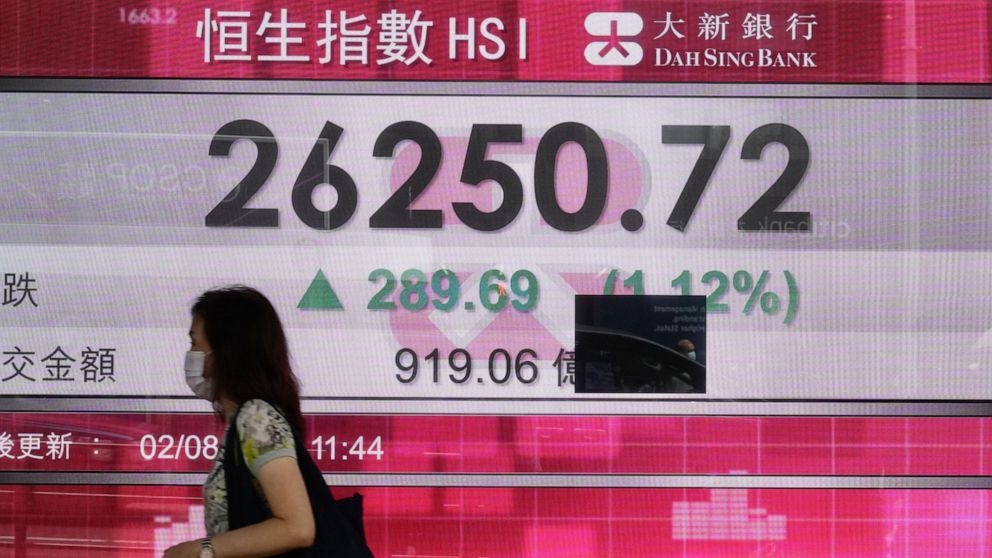Stocks end mixed after starting August off on a choppy note
Stocks closed mixed on Wall Street Monday after a day of choppy trading
SINGAPORE — Stocks gave back some of their recent gains Monday after a day of choppy trading on Wall Street led the major indexes to a mixed finish.
The S&P 500 slipped 0.2% in the final hour of trading after holding a slight gain for much of the afternoon. The benchmark index is coming off a weekly loss, though it ended July higher, its sixth straight month of gains. It remains within 0.8% of the all-time high it set a week ago.
A slide in technology, industrial, raw materials and communication companies weighed on the market. Energy stocks also fell in tandem with crude oil prices. Gains by health care stocks, utilities and a variety of retailers and other companies that rely on direct consumer spending helped keep the losses in check.
Demand for U.S. bonds rose, pushing their prices higher and sending their yields lower. In another sign of caution among traders, small company stocks fell more than the rest of the market.
While investors are feeling bullish about strong company earnings reports, with more expected this week, they’re also nervous about the spread of the more contagious delta variant of the coronavirus and how it might impact the economic recovery.
“There’s hope the delta variant’s resurgence is going to peak soon, but that’s not clear,” said Rob Haworth, senior investment strategy director at U.S. Bank Wealth Management. “That’s weighing on the market a little bit.”
The S&P 500 fell 8.10 points to 4,387.16. The Dow Jones Industrial Average dropped 97.31 points, or 0.3%, to 34,838.16, while the Nasdaq composite added 8.39 points, or 0.1%, to 14,681.07. The Russell 2000 index of smaller companies lost 10.75 points, or 0.5%, to 2,215.50.
Bond yields fell again. The yield on the 10-year Treasury note slipped to 1.17% from 1.24% on Friday. Crude oil prices closed 3.6% lower.
Investors are still closely watching any developments with the virus pandemic and how mutations and variants might impact economic growth amid a surge in new infections that’s driving hospital caseloads in some places to their highest levels since the outbreak began. Still, analysts don’t expect a big pullback in consumer or economic activity.
“The impact on the economy will be considerably more limited than it was in previous waves,” said Gary Schlossberg, global strategist at Wells Fargo Investment Institute.
This week will be busy for investors. Roughly 150 members of the S&P 500 will report their results, and the July jobs report comes out on Friday.
Companies that will report this week include DuPont, Eli Lilly, CVS, Kraft Heinz, General Motors and Humana, among many others.
So far earnings season has been strong for corporate America, with the average S&P 500 company reporting an 85.1% growth in profits from last year. Roughly nine out of ten companies have beaten expectations on both profits and revenue. The index is on pace to have its strongest earnings season since 2009.
Investors also have their eye on Washington after Republicans and Democrats made progress in advancing President Joe Biden’s infrastructure package over the weekend. The package is expected to be passed in the Senate by the end of the week.
Traders are getting a few pieces of economic data this week that could help them better gauge the economy’s health.
The Institute for Supply Management, a trade group of purchasing managers, said manufacturing slowed in July. Many companies are being held back by supply chain issues. The trade group will release its report on the services sector on Tuesday, which is a much bigger piece of the U.S. economy.
Meanwhile, Square jumped 10.2% after the payments company said it would acquire the “buy now, pay later” company Afterpay for $29 billion.
![]()


